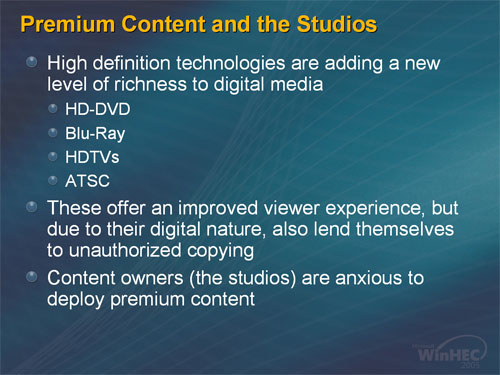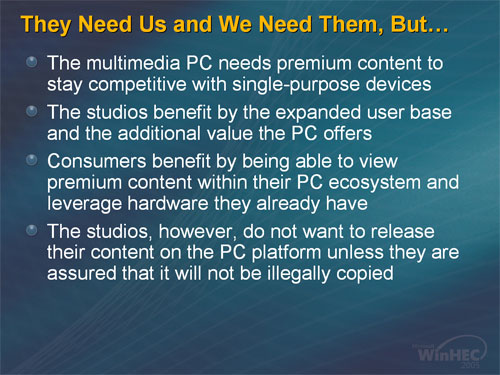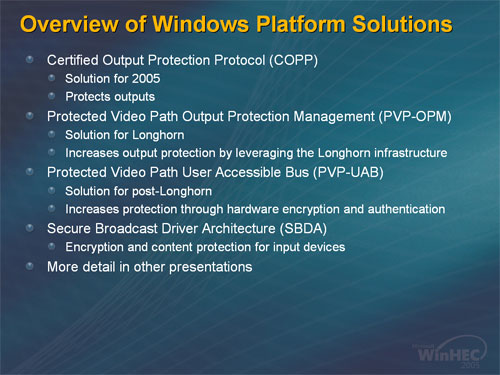WinHEC 2005: Day 2
by Derek Wilson & Jarred Walton on April 27, 2005 8:45 AM EST- Posted in
- Trade Shows
Digital Media Content Protection
In order to gain traction as a home entertainment device, the industry is being forced to support various forms of content protection. ATI gave a presentation on the subject, discussing the costs, benefits, and requirements of content protection. The presentation was certainly one of the more entertaining events so far, if not for the usual reasons. First, let's talk about why we "need" content protection.

The basic reason for protecting content is that new digital versions are enabling the reproduction and distribution of high quality copies. While in the past there was often a degradation of quality by making an analog copy of a movie or song - or a copy of a copy to the nth level - digital content can be reproduced indefinitely with no loss in quality. Since all users are naturally thieves and pirates, no one will ever pay for content again, right? Sarcasm aside, that seems to be the attitude of the content providers. However, due to the large installed user base, it is becoming difficult to ignore the PC as a multimedia platform.

This slide basically summarizes the situation. The content creators want to expand their user base. Meanwhile, the consumers want to be able to use the content which they have purchased as well as any hardware they have in whatever way they see fit. For example, the consumer may wish to place a song they have purchased on a CD for use in a car, or on an MP3 player for jogging. Consumers also want to save money, i.e. buy a single multi-function device like a PC rather than purchasing several single-function devices. These goals are in conflict with each other, unfortunately, and this has been a hot topic of debate over the past several years: consumer fair-use rights vs. copyright holder rights.

As the presentation progressed, ATI discussed the technical solutions that are being developed to ensure that the PC can continue to grow as a multimedia platform. Microsoft is working with vendors to create increasing levels of content protection, which will be rolled out over the coming years. We would say that past experiences such as the breaking of DeCSS - which is a major part of what has brought us to the current stalemate - have created a certain amount of paranoia with the content providers. It's difficult to say whether the above solutions will truly be sufficient, or if they are merely meant as a token effort to combat piracy and lull the content providers into a false sense of security. After all, anything that must eventually be shown in an unencrypted format can be captured at that point; we would say it's simply a matter of time before some of the new encryption schemes are bypassed by the ne'er-do-wells of the world.
The audience reaction to the presentation was decidedly unenthusiastic. The hardware vendors don't seem to like the idea of spending more money on their designs and the consumers don't want to be limited in how they use the products they purchase. Several people approached the microphone to ask critical questions and/or make disparaging comments on the situation, and they were greeted with applause from many of the other attendees. We got the distinct impression that while the hardware vendors were afraid to publicly speak out for fear of being cut off, they would all really prefer to avoid doing extra work which will likely prove futile.
If we take a broad look at the market, TV, movies, and music have been around for decades without real encryption or protection, and yet consumers continue to spend money on them. Fair Use rights such as the ability to make a backup copy or convert a product to a different medium have not yet killed off the content providers. In fact, some would argue that new technologies such as MP3s have only increased the number of people hearing and purchasing content.
There will always be those that try to get something for free where possible, but many people are only looking to pay a reasonable price for a reasonable product. If the RIAA had hurried to create solutions such as iTunes rather than waging a legal war against Napster and the other file-sharing services, they may have saved themselves time and money. Those who fail to learn from the past are condemned to repeat it, unfortunately. For better or for worse, content protection appears to be a large part of the future of digital entertainment.










22 Comments
View All Comments
Turin39789 - Wednesday, April 27, 2005 - link
millenium falcon?gsellis - Wednesday, April 27, 2005 - link
Thanks for the reports. Changed jobs this year and could not go. :(